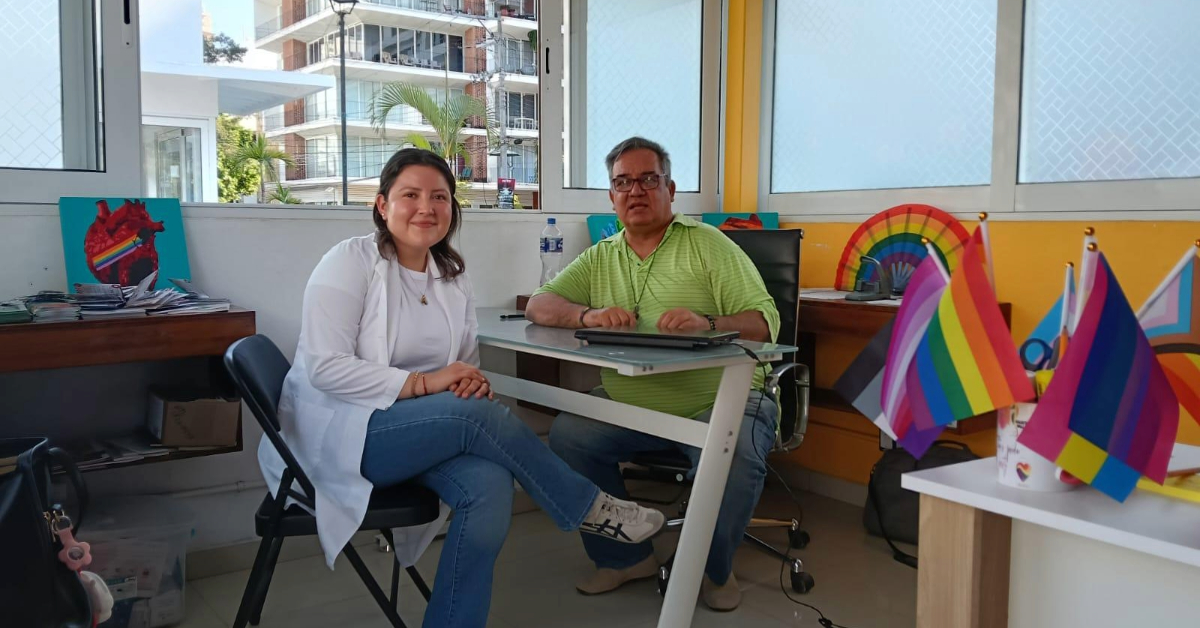Under Mayor Luis Munguía’s administration, Puerto Vallarta’s Office of Sexual Diversity has added a specialized physician and enhanced legal and tourist support in Lázaro Cárdenas Park, strengthening inclusive, respectful healthcare for the LGBTQ+ community.
Puerto Vallarta’s municipal government has taken a significant step toward ensuring equitable, quality healthcare for its LGBTQ+ residents and visitors. Under the leadership of Mayor Luis Munguía, the city’s Office of the Director of Sexual Diversity recently announced the expansion of its services, most notably through the addition of a dedicated physician to its roster of specialists.
Since its reopening in Lázaro Cárdenas Park—affectionately known as Parque de Los Azulejos—the Sexual Diversity Office has offered a variety of support programs ranging from legal counseling to tourist information. With the arrival of Dr. Héctor Ramírez Betancourt as the office’s medical care provider, these offerings now include vital sign monitoring and personalized medical guidance tailored to the unique health needs of the LGBTQ+ community. “Our goal,” explains Ramírez Betancourt, “is to provide a welcoming environment where everyone can receive professional, stigma-free care. If a patient requires specialized follow-up, we coordinate referrals to Dr. Tucán’s Clinic, ensuring continuity and comprehensiveness of treatment.”
This development reflects a broader vision articulated by the Munguía administration: building a safer, more respectful city for all citizens. Puerto Vallarta has long been celebrated as one of Mexico’s most LGBTQ+-friendly destinations, drawing international travelers and fostering a vibrant local community. Nevertheless, Mayor Munguía has acknowledged that the social benefits of inclusion must be underpinned by accessible public services. “Tourism is vital to our economy,” he commented at the program’s unveiling, “but our responsibility begins at home. By expanding these services, we’re reinforcing Puerto Vallarta’s reputation as a place where diversity is not just tolerated but celebrated.”
In addition to medical support, the Sexual Diversity Office continues to offer free legal advice for issues ranging from identity documentation to workplace rights. Information desks staffed by volunteers provide visitors with up-to-date guidance on LGBTQ+-friendly establishments, events, and safety resources. Community advocates point to these services as critical lifelines, particularly for individuals who may be experiencing discrimination or isolation. “Having a central point where you can both seek medical attention and get reliable information about your rights is transformative,” says local activist Marisol Hernández. “It sends a clear message: you are recognized and valued here.”
The logistics of operating a government-run health program in a public park posed early challenges. The office space in Parque de Los Azulejos was refurbished last year to include private consultation rooms, a small laboratory station for basic testing, and a reception area designed with vibrant murals by local artists. These artistic touches pay homage to Puerto Vallarta’s cultural heritage and reinforce the message of openness. “Art has always been a vehicle for expression within our community,” recalls Héctor Ramírez Betancourt. “We wanted patients to feel that they’re stepping into a safe—and even inspiring—space.”
Feedback since the doctor’s arrival has been overwhelmingly positive. In its first month alone, the office logged over 200 medical consultations, with inquiries spanning hormone therapy guidance, STD prevention counseling, mental health referrals, and routine health screenings. According to Dr. Ramírez Betancourt, the demand underscores an unmet need that the municipal government is now positioned to address. “We’re only at the beginning,” he notes. “Our plan is to introduce telehealth options later this year, expanding reach to residents in outlying neighborhoods and nearby communities.”
Local nonprofits and community groups have also pledged their support, organizing health fairs and pop-up clinics in collaboration with the Sexual Diversity Office. These events aim to bring medical screenings—such as HIV testing and blood pressure checks—directly into neighborhoods, lowering barriers for individuals who may not be able to travel to the park location. “Collaboration is key,” says Hernández. “When government and civil society work together, we create a network that can truly sustain inclusive care.”
The expansion aligns with national efforts to promote LGBTQ+ rights and healthcare access across Mexico. While federal regulations guarantee non-discrimination in health services, implementation often depends on local leadership. Puerto Vallarta’s initiative has drawn attention from other municipalities seeking to replicate its model. Officials from several coastal cities visited the park facility last month to observe operations and discuss best practices.
As Puerto Vallarta continues to grow as a premier tourist destination, the administration’s investment in inclusive public services sends a powerful message. Through the addition of a specialized physician, enhanced legal support, and comprehensive tourist resources, the Office of Sexual Diversity is cementing its role as a cornerstone of community well-being. For LGBTQ+ residents and visitors alike, these measures promise not only improved access to care but also a deeper sense of belonging in one of Mexico’s most welcoming cities.
Under Mayor Luis Munguía’s administration, Puerto Vallarta’s Office of Sexual Diversity has added a specialized physician and enhanced legal . . .












